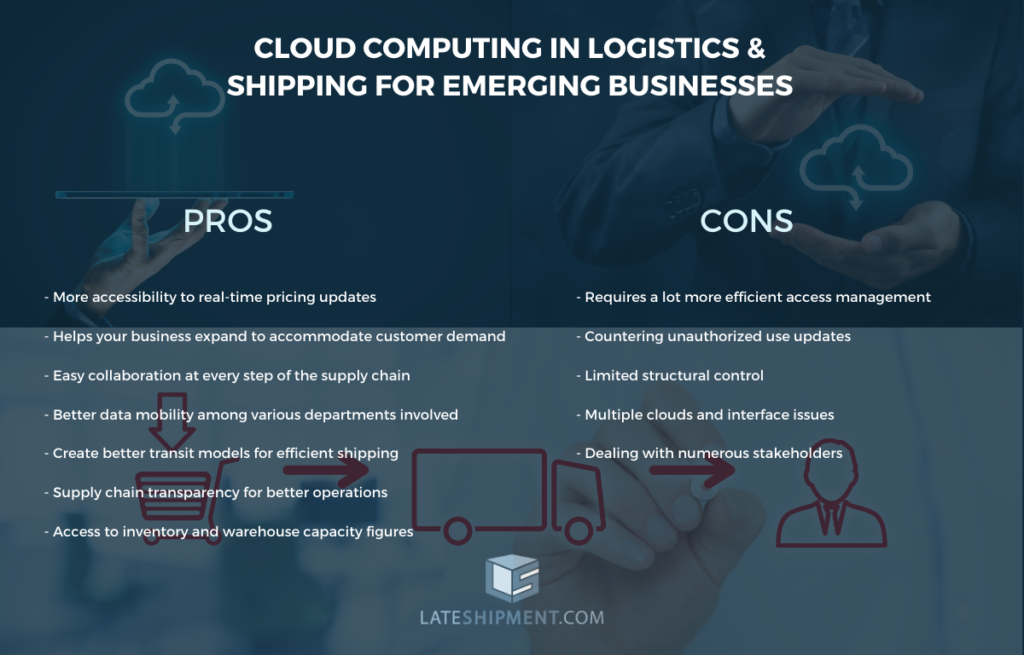You might have come across many technical terms being hyped by tech-enthusiasts, but ‘cloud computing’ rightfully deserves the attention it has been getting over the last few years.
Cloud computing is revolutionizing technology that has created a buzz in many business areas due to its ease of accessibility and flexibility.
According to the recent cloud computing statistics, the global public cloud market will exceed estimated expectations worth $330 billion as the year 2020 wraps up.
After looking at such exponential figures, there is no doubt that companies worldwide have outgrown the outdated technologies and expanded their investments towards cloud computing.
Undoubtedly, the advanced technology has been successfully integrated into the logistics and shipment industry as well.
Today, cloud-based logistics software is considered much more efficient to fulfill commercial needs and provide value-added services to customers.
Let’s find out what pros and cons the revolutionary technology has for the logistics and shipping companies.

Advantages of Cloud computing in the Logistics Industry
The following are some of the best benefits one can reap by integrating cloud computing in the logistics industry.
1. More accessibility to real-time pricing updates
Various elements can directly affect pricing when it comes to transportation and warehousing.
External factors like market conditions, customer demands, sales fluctuations, weather changes, and other such volatilities have the power to make or break your margins.
Not every person can have real-time access to such fluctuations and call the next big trend change that could affect the pricing. Cloud computing does precisely that for you. It provides more accessibility to real-time pricing updates.
Like for instance, you receive immediate notice that freight rates have changed, but if you are out of the station, you can still communicate the necessary changes needed to be made to accommodate the sudden change of rates in your favor.
2. Helps your business expand to accommodate customer demand
A smooth supply chain is essential for a company’s operational efficiency.
Given the customer-centricity and the significance the supply chain provides to it, a streamlined supply chain can do a lot more to match customer demands. It can give your business a boost across all the associated supply chain channels without costing the business a fortune.
Organizations require flexibility and integration to survive the competition in the market. And cloud computing can be the right answer.
Cloud computing is a game-changer for businesses to expand and meet customer demands by deploying new agility services.
– Data from Accenture
3. Easy collaboration at every step of the supply chain
Logistics has been transformed ever since technology has been integrated every step of the way.
Where the supply chain has become more complex and dependent on every step, a smooth and streamlined collaboration has become vital for sustaining your business operations.
Because the supply chain quickly multiplies the cost down the value stream, even the slightest change that can help you save through access to real-time pricing information is a significant win for the company.
Therefore, cloud-based logistics is the key to breaking down communication and pricing issues in the supply chain. It will help create a more predictable supply chain by connecting the process through the cloud.
4. Better data mobility among various departments involved
Logistics and shipment require real-time access to data from various departments.
Deploying cloud computing allows better data mobility through the organization’s various departments to streamline the supply chain and make better decisions. This not only saves time and resources but instead directs the use of resources towards other innovations.
Cloud computing allows speedy data deployments of departments like management, maintenance, IT, and other upgrades that are involved in the supply chain. It affects efficiency and productivity through tangible means as it takes open and seamless integration of all the other departments involved to work together.
5. Create better transit models for efficient shipping
If your supply chain requires coordination from several suppliers spread on a larger scale, then it should be seamlessly aligned and synchronized. And cloud computing can help you do just that with regards to your logistics.
Cloud-based logistics solutions easily provide real-time monitoring access to create better transit models for efficient shipping.
The real-time data is not only remotely accessible, but it is available for the entire team regardless of time or location.
Even if you want in-transit models spanning on a global scale, cloud-based logistics solutions can be integrated to efficiently cover, optimize, and manage such formidable and complex trails.
It is easier to deploy and less-costly to initiate.
6. Supply chain transparency for better operations
Cloud solutions allow you to connect with multiple dimensions of your organization.
You can connect with internal and external departments, your partners, and even the services that you have outsourced.
As you integrate cloud in the supply chain and connect all of your inter-departmental partners, it provides real-time transparency at every supply chain level.
It allows you to keep your supply chain inbound functions, outbound operations, and logistics data process under control and your customers satisfied.
The visibility at every step makes it easier and quicker to deploy the means that can carry forward the process, ultimately making it more streamlined.
7. Access to inventory and warehouse capacity figures
Inventory is the starting point and probably the full-circle endpoint of a supply chain. That is why on-hand inventory is the most direct way through which you can easily control the risk factors and optimize your costs.
Cloud allows you to instantly access your on-hand inventory figures and information to maximize your ability to respond to the on-going fluctuations.
The consistent inventory data flow through the cloud allows you access to specific details like profit margins and highest seller figures etc.
Such valuable information can impact your sales significantly and allow you to make better orders to fulfill customer demands.
Disadvantages of Cloud computing
Where cloud computing can be a shining gold armor for logistics and supply chain management, organizations should understand that there are just as many unique risks involved with cloud adoption.
1. Requires a lot more efficient access management
Cloud computing in logistics can lead to inefficient access management in two ways.
One happens through an inefficient credential policy where there is no need for strong passwords to protect the data.
There are no frequent updates in the system to counter any territorial breaches.
The other one happens when risk is known as shadow IT or a rogue IT system that makes use of systems, devices, software applications, and services without a clearly defined IT approval.
2. Countering unauthorized use
It requires countering of unauthorized usage, whether the breach has been made through intentional or unintentional means.
However, the main reason behind the breach is the irresponsibility of the employees who might be using untested and unauthorized means to access the cloud servers that harm the entire logistics and supply chain system.
3. Limited structural control
Due to the risk involved, the companies are advised to protect their systems to every extent possible.
This minimizes the structural control but also closes the access to endpoints that can be exploited.
Limiting potential attack surfaces can be detrimental to the overall supply chain structural integrity, but there is no other way to ground the operations safely.
4. Multiple clouds and interface issues
If the cloud system is accessed through an application program interface or API, it can automate almost every transaction your organization has ever made and expose it to the world.
Such issues stem from several factors involved in the overall system.
Configuration and deployment of multiple clouds require the assurance that they are compatible with each other.
Negligence towards and lack of investment made in this regard enables more APIs that can then become potential entry points for hackers.
5. Dealing with numerous stakeholders
As a logistics company, you would be having multiple suppliers, clients, and stakeholders in general.
Therefore, logistics companies must know the main stakeholders in freight distribution and how different actions can impact their corporate relations with them.
The sharing of your resources and cloud system data among your stakeholders, tenants, and customers is risky.
Resources are vulnerable to leakage, and anybody with ill intentions can get easy access if they want to use such information against you.
Wrapping It Up!
All in all, there is no doubt that cloud-based solutions are here to stay when it comes to logistics, shipment, and supply chain companies.
These companies can easily achieve better operations, execution of tasks, collaboration within the business circle, and overall high functionality through cloud computing.
Therefore, in the upcoming future, we will see many logistics companies moving towards and adopting such cloud practices and generally advancing in the digital realm of performing company operations.
Cloud computing may not be regarded as groundbreaking anymore due to its high adaptability in every business format.
Still, it is breaking barriers when it comes to making seamless supply chain management processes for companies adopting it.
This article is a guest contribution by Samantha Kailee
Samantha Kaylee is currently working as a Planning Manager at Crowd Writer, an excellent platform that offers services like write my assignment UK. She has gained significant experience in logistics due to her previous job in a renowned shipping company. You can check out her blog for recommendations and expertise.








